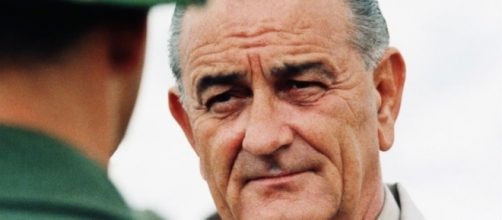Lyndon Johnson will not be remembered by most of the today's readers. He was our president after JFK was murdered in Dallas. He was a Democrat who could muscle through legislation with a skill that would make Mitch MrConnell's jaw drop. Despite his Texas roots, he became a hero to Civil Rights partisans for getting the voting rights act passed. He made Martin Luther King Jr. weep when he repeated the title of the civil rights anthem "We Shall Overcome."
LBJ problem
Lyndon also had the fortitude to quit when he knew he was behind. The Vietnam war was his nemesis and in large part his fault.
He was caught in the same cold war meme that continues to strangle much of our politics. But the war was desperately unpopular. LBJ was hit with demonstrations that Trump has never even imagined. "How many kids did you kill today?" came the constant chants of young Americans.
David Brooks
But my reason for bringing up LBJ is to take note of a remarkable admission by the columnist David Brooks. LBJ and the rest of America did not notice that its civil rights effort was mostly beneficial to a small part of the Black community. The politics of the 1960s ignored what anyone who stood in the middle of the rioting could easily see. Malcolm X saw it and understood it. A vast underclass existed. Today that underclass is either in prison or confined to ghettos that exist both in inner cities and some suburban areas.
Such integration as we have is not progress. It is tokenism. And David Brooks just discovered how good the upper class is in ensuring that things do not change.
How We Are Ruining America https://t.co/T2gIIvWe9C
— Stephen C. Rose (@stephencrose) 11 July 2017
In the hyperbolic lingo of NYT columnists, he suggests we are ruining America.
But the truth is the die was cast almost exactly at the same time that there was joy in LBJ's signing of the voting act. When civil rights became saving some and essentially leaving the rest to fend off the police and the welfare workers, we were merely engaged in creating the foundations of today's more and more polarized world.
Movement of the people
There is a solution. It is an exodus. An exodus to a city of the future that should be the model for everyone. Justice begins with integration. It cannot be obtained without face to face reconciliation and shared experiences. Segregation is our current model, and it is the heart of our problem.
Cybercommunities are the answer
We should move to a car-free world. We should reduce militarism and increase investment in children, even babies. We should see education as utterly individual and key it to enabling children and all others to gratify any curiosity they possess. We should articulate jobs so we can easily employ one another with no red tape or complications. We need David Brooks to dwell on the problem he raises in today's column.


